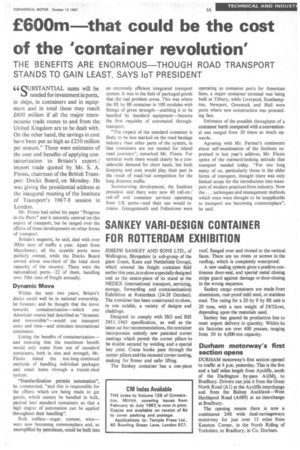£600m that could be the cost of the 'container revolution'
Page 57

If you've noticed an error in this article please click here to report it so we can fix it.
THE BENEFITS ARE ENORMOUS—THOUGH ROAD TRANSPORT STANDS TO GAIN LEAST, SAYS loT PRESIDENT
46 UBSTANTIAL sums will be
1.3 needed for investment in ports, in ships, in containers and in equipment and in total these may reach £600 million if all the major transoceanic trade routes to and from the United Kingdom are to be dealt with. On the other hand, the savings in cost have been put as high as £250 million per annum." These were estimates of the cost and benefits of applying containerization to Britain's export / import trade quoted by Mr. S. A. Finnis, chairman of the British Transport Docks Board, on Monday. He was giving the presidential address at the inaugural meeting of the Institute of Transport's 1967-8 session in London.
Mr. Finnis had called his paper "Progress in the Ports" and it naturally centred on this aspect of transport, but he ranged over the effects of these developments on other forms of transport.
Britain's seaports, he said, deal with over 300m tons of traffic a year. Apart from Manchester, all the sizeable ports were publicly owned, while the Docks Board owned about one-third of the total dock capacity of the country. These were the nationalized ports 22 of them, handling over 50m tons of freight annually.
Dynamic Move
Within the next two years, Britain's docks could well be in national ownership, he forecast; and he thought that the move towards containerization—which one American source had described as "dynamic and irreversible"—would cut transport costs and time—and stimulate international commerce.
Listing the benefits of containerization— and stressing that the maximum benefit would only come from use of standard containers, both in size and strength, Mr. Finnis slated the too-long-continued methods of handling individual packages and small items through a transit-shed system.
"Standardization permits automation", he commented, "and this is responsible for the efforts which are being made to get goods, which cannot be handled in bulk, packed into standard containers so that a high degree of automation can be applied throughout their handling".
Bulk traffics—sugar, cement, wine— were now becoming commonplace and, as exemplified by petroleum, could be built into an extremely efficient integrated transport system. It was in the field of packaged goods that the real problem arose. This was where the 8ft by Sit container in 10ft modules with fittings of given strength—enabling it to be handled by standard equipment—became the first requisite of automated throughtransport.
"The impact of the standard container is likely to he less marked on the road haulage industry than other parts of the system, in that containers are not needed for inland road journeys", remarked Mr. Finnis. For terminal work there would clearly be a considerable demand for short hauls, but both licensing and cost would play their part in the result of road /rail competition for the long-distance traffic.
Summarizing development, the Institute president said there were now 40 roll-on / roll off and container services operating from UK ports—and their use would increase. Grangemouth and Felixstowe were operating as container ports for American lines, a major container terminal was being built at Tilbury, while Liverpool, Southampton, Newport, Greenock and Hull were ports where new construction was proceeding fast.
Estimates of the possible throughput of a container berth compared with a conventional one ranged from 20 times as much upwards.
Agreeing with Mr. Farmer's sentiments about self-examination of the Institute expressed in last year's address, Mr. Finnis spoke of the outward-looking attitude that transport needed today. "For too long many of us, particularly those in the older forms of transport, thought there was only limited scope for the introduction into transport of modern practices from industry. Now the .. . techniques and management methods which once were thought to be inapplicable to transport are becoming commonplace", he said.


































































































































